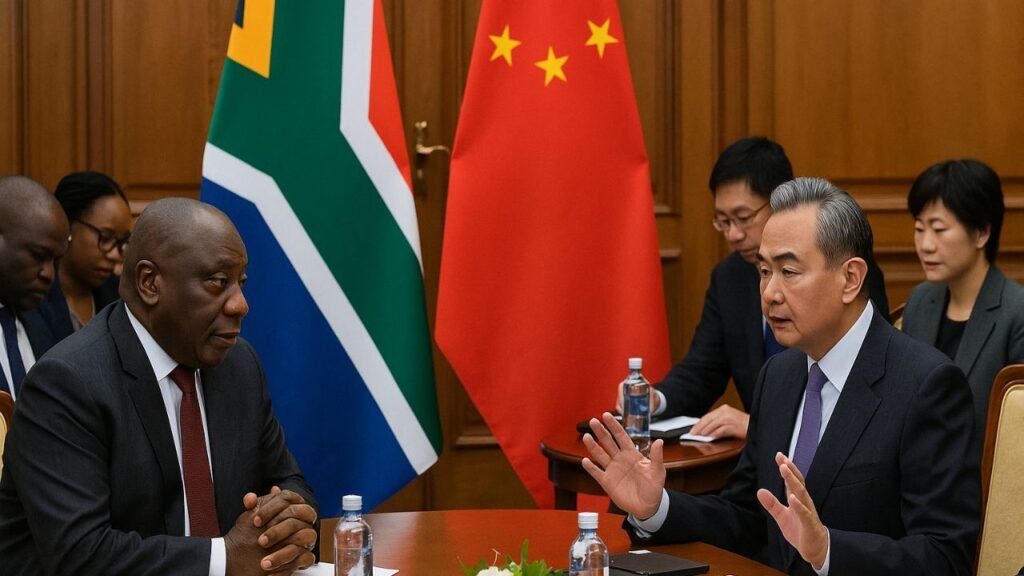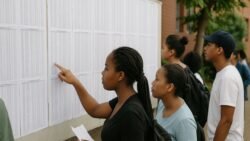China Naval Drills – SA has formally requested China to postpone its scheduled naval drills, citing the upcoming G20 Summit as a critical moment for diplomatic engagement. South African officials have expressed concern that the timing of these exercises could create unnecessary tension, potentially overshadowing key discussions on global economic recovery and multilateral cooperation. The request aligns with South Africa’s long-standing diplomatic strategy to maintain balanced relations with major global powers while ensuring regional stability in the Indian Ocean. Analysts believe that by requesting a delay, Pretoria aims to signal its commitment to constructive dialogue and peaceful engagement. According to reports, the G20 Summit, which will host world leaders from the largest economies, presents an opportunity for South Africa to reinforce its role as a mediator on critical international issues. Naval movements near strategic shipping lanes have historically been sensitive topics, and the South African government is keen to ensure that its maritime security policies are not misinterpreted as hostile. Sources note that this diplomatic approach underscores the country’s nuanced foreign policy strategy (Reuters).

Strategic Implications of the Request
The South African government’s request to China carries significant strategic implications for regional security. By seeking a postponement, South Africa is emphasizing the importance of a stable maritime environment, particularly around the critical trade routes off the coast of the country. This region is vital for both commercial shipping and naval logistics, making any military exercises a potential flashpoint. Experts note that South Africa’s approach reflects a broader commitment to multilateral cooperation and crisis prevention. In addition, the move sends a subtle message to other global powers that Pretoria prioritizes diplomacy over confrontation, particularly in the lead-up to international gatherings like the G20 Summit. Analysts from the Institute for Security Studies highlight that South Africa’s proactive stance can help reduce misunderstandings and mitigate the risk of miscalculations that could escalate tensions unnecessarily. By requesting a temporary delay in naval drills, the country strengthens its image as a responsible actor in international security while safeguarding its own strategic interests.
Diplomatic Channels and Negotiations
The process of requesting a postponement involved careful diplomatic channels, including communications between the South African Department of International Relations and Cooperation (DIRCO) and the Chinese Ministry of National Defense. Officials coordinated through formal letters and back-channel discussions to ensure the message was clear yet respectful. This method reflects South Africa’s preference for negotiation and dialogue over unilateral action. Diplomats stress that maintaining open communication is essential, particularly with major powers whose military activities can have regional implications. Analysts suggest that the timing of the request demonstrates strategic foresight, as it allows both nations to coordinate and avoid unnecessary friction. The successful management of such negotiations can serve as a model for other countries navigating similar challenges (South China Morning Post).
Economic and Geopolitical Considerations
The postponement of naval drills also intersects with economic and geopolitical considerations. The Indian Ocean is a critical artery for global trade, and South Africa’s ports serve as key logistical hubs for international shipping. Any disruption or perceived threat in the region could impact trade flows, affecting both local and international markets. By advocating for a delay, South Africa aims to protect these economic interests while ensuring that geopolitical tensions do not overshadow international cooperation. Analysts from Al Jazeera note that the timing of military exercises near major trade routes can influence investor confidence and regional stability. Therefore, the decision to engage China diplomatically reflects a calculated effort to maintain both economic security and diplomatic goodwill.
 Historic Win at Lord’s: Temba Bavuma Leads SA to First Bilateral ODI Series Victory in 27 Years
Historic Win at Lord’s: Temba Bavuma Leads SA to First Bilateral ODI Series Victory in 27 Years
South Africa’s Role on the Global Stage
This initiative reinforces South Africa’s role as a proactive and responsible player on the global stage. The country has consistently positioned itself as a bridge between developed and developing nations, often advocating for dialogue and consensus-building in multilateral forums. By requesting a postponement of the naval drills, Pretoria demonstrates its commitment to ensuring that international summits like the G20 Summit remain focused on collaboration and constructive outcomes. Experts believe this move not only mitigates potential diplomatic strain but also enhances South Africa’s credibility as a mediator in complex international issues. Sources from BBC News suggest that such actions highlight the importance of timing and diplomacy in maintaining stable international relations, particularly in sensitive security contexts.





